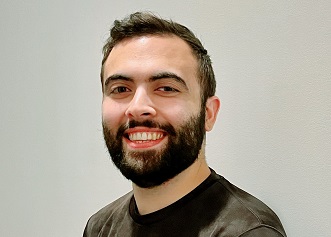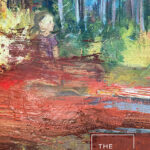Associate Editor James Ellenberger: We’re pleased to present Chetna Maroo’s short fiction piece “A Hard Jar of Gunpowder” for this week’s miCRo feature. By beginning with allusions to Babel then moving onto smattered quotations from Kepler about attraction, Maroo’s unnamed speaker shows a clear interest in the invisible forces that prod our lives along. The shift into an epistolary mode for the latter half of the piece shows this as well; while the father isn’t around, having abandoned his daughter to “the heathen pit,” the implied knowledge of his existence compels the daughter to write against her situation, finding solace in the untold power that hums in blank spaces and absences. What compels us to do anything? Is it our current situation, our perception of God, or the work of critical thinkers who have challenged aspects of our shared reality? In a time when it’s difficult not to consider the intentions of our best and worst, Maroo’s work does an excellent job showing us how to speak and engage even when we may not be able to do so freely.
“A Hard Jar of Gunpowder”
By Chetna Maroo
My father left me outside the place he had once described as a heathen pit, telling me that he had no choice, that there were good men inside though they might not believe in our Lord, who, on the plain of Shinar, confused their minds as badly as He had confused their speech. He told me they would take care of me and he would come for me after the snows.
A shimmering white frost covered the ground that winter. People went about in roughhewn fur-lined coats and boots that crushed the frozen grass. I didn’t wear my winter things; there was too much heat inside my body. The other girls avoided me due to the violence with which I had demanded they leave me alone, and now I deliberately dragged myself here and there, making my body heavy, thinking about the slow beat of the sea against a rocky shore, of my father’s house that stood atop sea-facing rocks, shuddering. I wondered if it were possible to increase your own mass, to open up a space around you, simply by willing it.
They said I might write to him. I did, three times.
Father
There is something I want to tell you. You might know it already, but I don’t think so. A man named Johannes Kepler found this out: If two stones were placed anywhere in space near to each other, and outside the reach of force of a third cognate body, then they would come together, after the manner of magnetic bodies, at an intermediate point, each approaching the other in proportion to the other’s mass. Johannes Kepler found this out a long time ago, but it is still more or less true.
I am doing my best.
Your loving daughter.
Father
You must be getting on with things, like bringing the hay in and feeding the pig. People like us don’t need much, but we have to eat and work to keep our weight up. About money, I haven’t come upon too many things that will help us, but I will write and tell you when I do, maybe when I get your reply. Johannes Kepler, who I told you about, added this: If the earth ceased to attract the waters of the sea, the seas would rise and flow into the moon.
I am doing my best.
Your loving daughter.
Father
Johannes Kepler did not account for those stones having any will of their own, because what he found out is not up for negotiation.
Please write.
My father never replied. I imagined he had suffered the same fate as Johannes Kepler’s father. Kepler put it like this: 1577: he ran the risk of hanging. He sold his house and started a tavern. 1578: a hard jar of gunpowder burst and lacerated my father’s face.
In his time, Johannes Kepler had attempted poetry, and during my years inside the heathen pit, I discovered a lyrical fire in all his work.
Chetna Maroo was born in Nairobi, Kenya and grew up in England. She currently lives in London, where she is working on a collection of stories, one of which is included in the Bristol Short Story Prize Anthology, Volume 10 (Tangent Books, 2017).
For more miCRo pieces, CLICK HERE.












